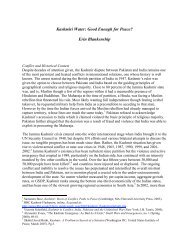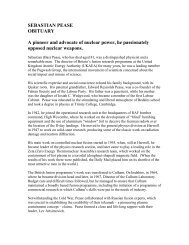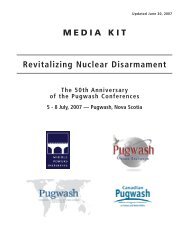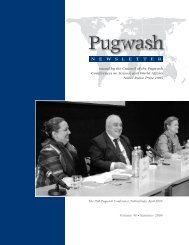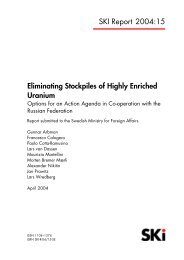The Ninth and Tenth Pugwash Quinquennia 1997–2007
The Ninth and Tenth Pugwash Quinquennia 1997–2007
The Ninth and Tenth Pugwash Quinquennia 1997–2007
You also want an ePaper? Increase the reach of your titles
YUMPU automatically turns print PDFs into web optimized ePapers that Google loves.
<strong>The</strong> 2006 <strong>Pugwash</strong> Conference in Cairo<br />
such as election of the Council <strong>and</strong> confirmation of the<br />
President <strong>and</strong> Secretary General, as well as the revision of<br />
the documents on the goals <strong>and</strong> principles of <strong>Pugwash</strong>.<br />
Workshops <strong>and</strong> Study Groups. <strong>The</strong> primary analytic <strong>and</strong><br />
substantive work of <strong>Pugwash</strong> occurs in the several workshops<br />
<strong>and</strong> study group meetings held during the year.<br />
<strong>The</strong>se are typically 2-3 day meetings of between 15 <strong>and</strong> 40<br />
people, selected on the basis of their knowledge <strong>and</strong><br />
underst<strong>and</strong>ing of the subject under discussion. <strong>The</strong> initiative<br />
for organizing international workshops rests with the<br />
Secretary General <strong>and</strong> the national <strong>Pugwash</strong> Group<br />
hosting the meeting, with the Secretary General satisfying<br />
himself/herself that conditions ensuring a high quality of<br />
discussion will be met. Suggestions on participants from<br />
national groups should be encouraged, with the Secretary<br />
General having the final say. Every effort should be made<br />
to commission high quality papers <strong>and</strong> to generally ensure<br />
the widest possible dissemination of workshop summaries,<br />
papers, <strong>and</strong> policy recommendations.<br />
Study group meetings are those workshops convened<br />
on particular topics, that meet sequentially over a period<br />
of time, <strong>and</strong> that consist of a high proportion of the same<br />
participants. Study groups are most often convened<br />
directly by the Secretary General <strong>and</strong> are the preferred<br />
format for those core <strong>Pugwash</strong> issues (nuclear weapons,<br />
chemical <strong>and</strong> biological weapons, regional security) where<br />
expertise <strong>and</strong> analysis need to be built up over time.<br />
Special Projects. <strong>The</strong> Secretary General may also commission<br />
special projects, carried out by small teams or individuals,<br />
on well defined topics. Such sustained projects could<br />
be carried out by ad hoc groups working under the supervision<br />
of the Secretary General, or by one or more national<br />
groups, after approval by the Secretary General. Such<br />
10 <strong>Pugwash</strong> Newsletter SPECIAL EDITION, October 2007<br />
projects may also be undertaken jointly with outside<br />
bodies.<br />
Other Activities. <strong>The</strong> Secretary General may also take<br />
advantage of special opportunities for convening private<br />
meetings between scientists <strong>and</strong> policy specialists on<br />
particularly urgent <strong>and</strong> sensitive matters. Although<br />
<strong>Pugwash</strong> normally avoids secret meetings, occasionally<br />
such non-publicized, private meetings can play a particularly<br />
useful role in advancing the objectives on which<br />
<strong>Pugwash</strong> was founded.<br />
Publications <strong>and</strong> Outreach<br />
Publications. While based on the premise that free <strong>and</strong><br />
frank discussions at <strong>Pugwash</strong> meetings are best served by<br />
keeping such meetings private, it is nonetheless of great<br />
importance that the results <strong>and</strong> analysis emanating from<br />
<strong>Pugwash</strong> discussions have the widest possible dissemination<br />
to the scientific/research community, policymakers,<br />
the media, other non-governmental organizations, <strong>and</strong> the<br />
informed public.<br />
<strong>The</strong> <strong>Pugwash</strong> Conferences have two general types of<br />
publications, internal (aimed primarily at the <strong>Pugwash</strong><br />
<strong>and</strong> scientific/scholarly communities) <strong>and</strong> external (aimed<br />
at policymakers, the media, NGOs, policy specialists, <strong>and</strong><br />
the informed public).<br />
<strong>The</strong> primary internal publication is the <strong>Pugwash</strong><br />
Newsletter, published twice a year, which includes<br />
coverage of <strong>Pugwash</strong> workshops, conferences, <strong>and</strong> other<br />
events, selected papers from <strong>Pugwash</strong> meetings, news of<br />
national <strong>Pugwash</strong> groups, <strong>and</strong> other items of interest to<br />
the <strong>Pugwash</strong> community, to colleagues in the scientific <strong>and</strong><br />
scholarly communities, <strong>and</strong> to research institutions.<br />
Increasingly, the <strong>Pugwash</strong> Website has complemented<br />
the Newsletter as a timely <strong>and</strong> ready source of information<br />
on <strong>Pugwash</strong> meetings, outreach activities, governance,<br />
national groups, <strong>and</strong> other information of interest to the<br />
<strong>Pugwash</strong> <strong>and</strong> wider scientific communities. <strong>The</strong> <strong>Pugwash</strong><br />
Website continues to exp<strong>and</strong> <strong>and</strong>, given its cost-effectiveness<br />
over printed materials, should be fully utilized as a<br />
resource to those with access to the world wide web.<br />
A third type of internal publication is the Proceedings<br />
of the <strong>Pugwash</strong> Annual Conference, which contain an<br />
archival record of papers presented at the Conferences.<br />
Given the high cost of printing the Proceedings in book<br />
form, <strong>Pugwash</strong> will investigate moving to a widely-accessible<br />
electronic format for archiving <strong>and</strong> distributing such<br />
papers.



